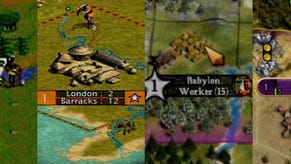A Civilized man
Sid Meier talks to Eurogamer.
The eponymous Sid Meier and starlet Firaxis designer Soren Johnson are putting a brave face on it. "It's good to travel," says Johnson blearily, "but I think we're really looking forward to getting home."
A bruising European promotional tour to push the launch of the long-awaited Civilization IV has left the two men shattered but smiling. London, a final stop before heading back to Maryland and the safety of a development studio responsible for arguably the most loved strategy series in gaming, has seen Sid signing copies of the new title and meeting fans at HMV on Oxford Street.
"It went very well," smiles Meier. "The British fans were very civilised and polite and positive."
Firaxis is extremely pleased with the way the PC game has been received in Europe, but it's no real surprise. Civilization, Meier's baby of some 15 years - which lets the player embark with a Stone Age settler, complete with knapsack, on a journey that culminates with hi-tech world domination - is a globe-crushing franchise, and the fourth instalment has reviewed hotly across the board. New features included in the latest in the long-running series are already starting to take root. Meier's particularly mindful of the fact multiplayer games are starting to pop up since the launch, an occurrence he describes as "really satisfying". Sid's nothing if not understated.
Sale of the Century
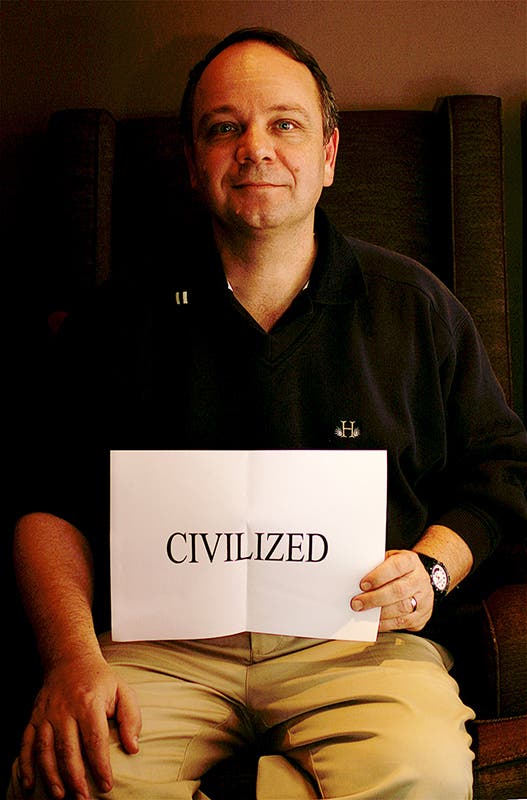
It's been a busy year for Meier. Aside from putting out a major game release, he finally sold Firaxis to a gleeful Take-Two (obviously, for an undisclosed sum). The company was founded in 1996 with Jeff Briggs, and its consumption signals a closure to one of the great independent development stories of videogame history as a whole. As with most other subjects, Meier dwells on the reasoning for the move with shining eyes and an ever-affable half-grin.
"We prefer to think of 'merging', but if you think of it as 'selling' that's fine," he says, chuckling. "It was something that we wanted to do to create a continuity, to allow us to focus on what we like to do, which is design games, and not have to worry about finances and meeting the payroll and keeping the lights on. It's not really a change in our philosophy, but it's hopefully going to allow us more time to create and design games, to work with a strong publisher that sees gaming in the same way we do, that sees gameplay as a primary part of the experience. So, we're happy to work even more closely with Take-Two, as it's known as a console company, I think, and we're able to learn from them in the console area. On the other hand, we can perhaps provide them a balance in some of the PC and strategy areas. I think it works best for everyone that we're working more closely together."
Consoles? Johnson, sitting next to Meier in the Covent Garden hotel, flicks a warning eye in his boss's direction.
"We definitely have an eye on the console market," Meier continues. "We're really happy with the response to Pirates!, which we brought out on PC and Xbox. It was our first console game, unless you count the Commodore 64 as a console. It's got to the point technology-wise, and in terms of the types of games people are really accepting on consoles now, that we're back in the mode of looking at the console marketplace as somewhere for us to grow in the future. So, no specific things that we've announced, but we're looking forward to Xbox 360 and PS3; we think there are some great opportunities. Even on the handhelds, we're seeing a lot of turn-based games."
He's talking about DS, obviously. The touch-screen and Civ? Meier agrees.
"It's almost like turn-based gaming is becoming the new, hot style of game. We'd hate not to be part of that."
The chances of Meier not being a "part of that" are close to zero. He's shaped the face of strategy gaming for so long it's hard to imagine the genre without him. And, as he's very keen to point out, there's plenty of life in the old dog yet.
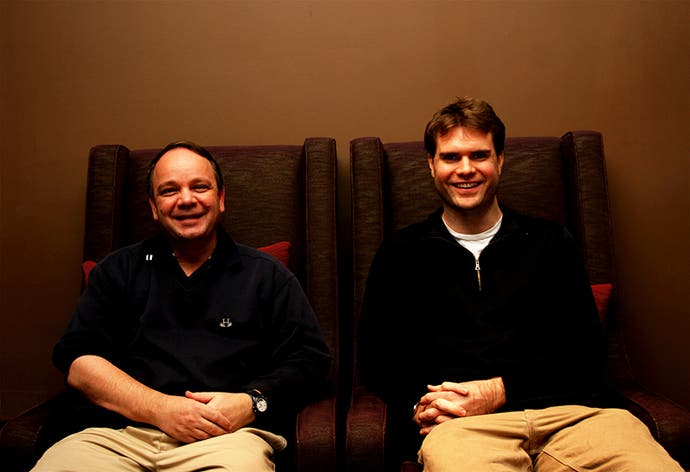
"No," he says when we suggest Civilization as a franchise may have just about run its course. "At the moment we're happy to put it aside for a while and let people play it, and all the stuff we could think of went into the game [Civ IV], but history shows that it may come back again. It's been 15 years, so it's not like we bring it out every year or two, but we wait an appreciable amount of time. I don't know. Who knows what the world's going to look like in a few years? But the idea's rich enough, I think, to sustain any number of games."
Fans will be glad to hear that. And Meier really is a fan's man.
"Our fans are so vocal and enthusiastic that it would crush them if we didn't bring out another one," he says. "Soren was talking this morning to a representative of Civ Fanatics, and it's amazing the people that have latched onto this game as defining their lives. It would be unfair and cruel not to do another game if they really want one."
We'd tried to get him to talk about expansions. We really did. All he'd say was that it was "safe to assume" they're working on them, and that Firaxis hasn't "quite announced them yet," so keep an eye out for news in the coming months. The Pit Boss expansion to the online game has already been confirmed, a free download to allow players time extensions to their multiplayer games, but for extra additions you'll just have to wait. Johnson and Meier probably only announce things when they're good and ready. In fact, it's extremely doubtful they do anything if they're not.
And one thing Meier's not ready to do is stop. Certain elements had suggested that the Firaxis sale indicated that the 52 year-old was relinquishing control, was slowing down. Doesn't sound like it.
"I enjoy the job," says Meier, shuffling in his seat and laughing. "I can't imagine a better job than designing computer games. I do everything else I have to do, then with whatever time's left over, I write games. So writing games fills up my free time as well. I think as the structure of teams and the way games are developed grows and evolves, my role changes from time to time. Some games I'm coding myself, and some games I'm just there to contribute what I can. But no, my intention's not to retire any time soon."
For God's sake
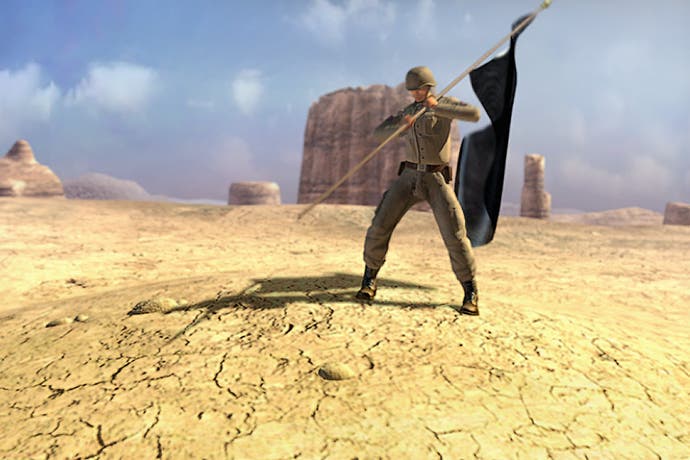
The proof is in the latest game itself; Meier's continued to build on his beloved turn-based concept. Civilization IV has arrived with a well-composed set of new features over previous versions, the main two being built-in online multiplayer and religious influence. Online play appeared as an add-on for Civilization III in Play the World, but it's only now that the concept is given a fully integrated run-out. Regardless though, it's religion as a gameplay tool that's been the most anticipated, and Johnson has certainly had his hands full with its implementation.
"We wanted to address religion," he chips in, "as there were only so many big topics we hadn't tackled. Religion was kind of 'the elephant in the room' that everyone knew about. We had to figure out a way to make it fun but not offensive. You could obviously go down the road where choosing your religion had a different effect for your civilisation, but, you know, we thought that would be... tricky."
Johnson and Meier eventually forged a religious gameplay system that would add the value they needed without outraging. All religions in Civ IV are basically the same, but as each game plays out they develop differently. So, the player may have some cities that follow Confucius, some cities that are Jewish, and they have to decide which one they want to pick as state religion, which parts of their empire they want to placate and encourage. Religion also has diplomatic reach, and choosing which denomination to follow will have great bearing on which opposing leaders will loath you or love you.
"It's always good for the diplomacy to become interesting, and religion became a great tool for that, because now you can see that other leaders have different religions and that's why they don't like you," says Johnson. "Plus, it gave us a lot of cool builder stuff. Civ's always deeper if players have more blocks to play with, and now we have all these different temple types and different cathedrals and synagogues and mosques and whatever, and they were a lot of fun to build."
Peace through superior firepower
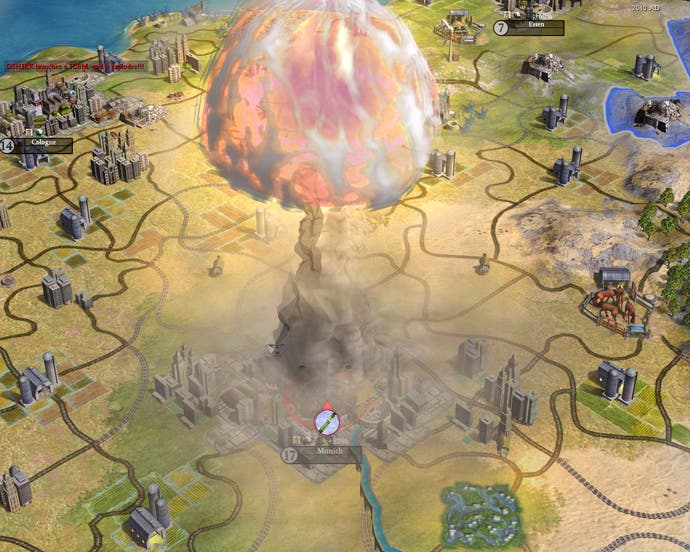
Including topics like religion, oppressive politics and nuclear war in a ubiquitous game like Civilization is no joke, especially not for someone as responsible as Meier. Current hysteria regarding violence in video games and an increasingly frenetic, violent political world has metered his methods of bringing such topics to market in a genteel way as never before, but his constant diplomacy never ceases to impress. He never "knowingly" allows any of the team to imbue their own politic beliefs on the games, he tells us, as he doesn't want the player to feel as though they're just playing out someone else's agenda. And on the topic of violence he's just as reserved, but it's here that his liberalism begins to creep through.
"Unfortunately, the politicians and the exaggerators and the line-drawers have got involved," he says, the trademark smile faltering. "You have to be either for or against [violence in games] and all shades of grey have disappeared. It's turned into a discussion that generates a lot of emotion and heat, and not much sanity and light."
He talks for some minutes and the rest of the room is silent. There's a middle ground to be found, he says, between hardliners on both sides of the violence in games issue. It's refreshing to hear a prominent figure from the world of games speak so openly on the subject. Most 'celebrities' in the industry won't go near it with a bargepole.
"In all art forms, times are often reflected in the art, so there are games that use a very contemporary, gritty style and are orientated for adults, but again it's not a black or white issue," he says. "What we're seeing is a new phenomenon, this idea that you have to take a stand that video games are horrible and they should be abolished, or that video games are perfect, that we can't learn anything, that we're doing everything perfectly. We can always learn more, and we should be open to learning more, but on the other hand I think we're doing a pretty good job at doing some pretty good entertainment. We should be appreciated for that, at least."
He's a Civilized man, Sid Meier. What's next for Firaxis?
"We certainly have some new things in mind that we're starting to work on," he says, the wry, sloping look creeping back. "We're certainly more and more interested in broadening to become both a PC and a console developer. Our relationship with Take-Two allows us to do that. They have a lot of resources and knowledge in that area for us to draw upon. I think that we'll continue to do the kind of games that we like to do, whether they're strategic or action-orientated. We're not looking at any radical changes: just to expand Firaxis gaming to take over the world."



